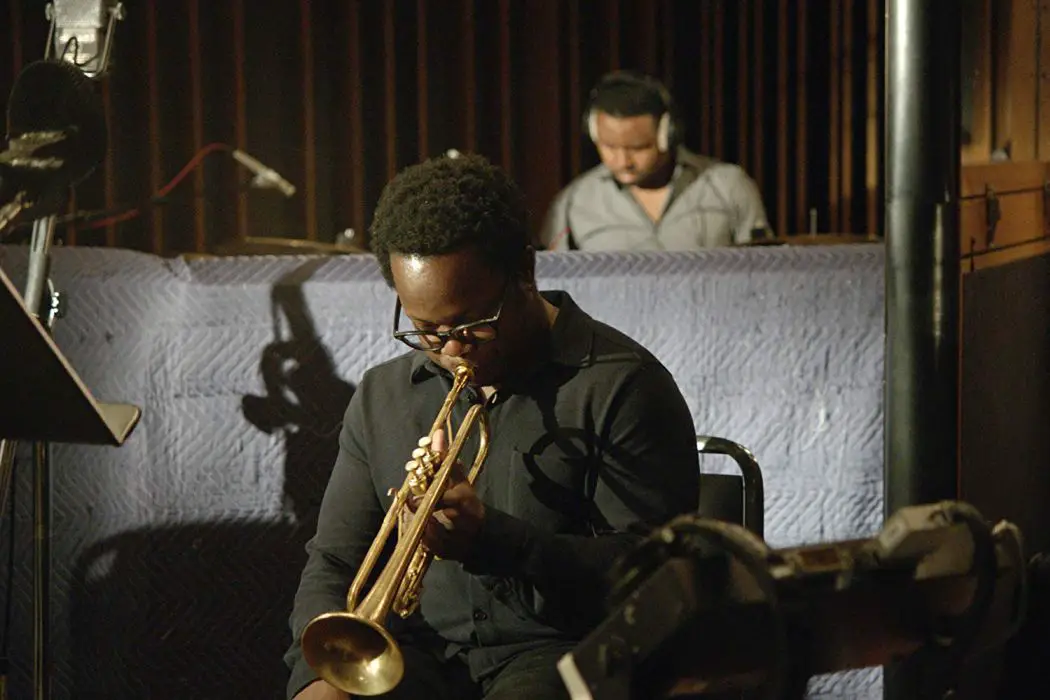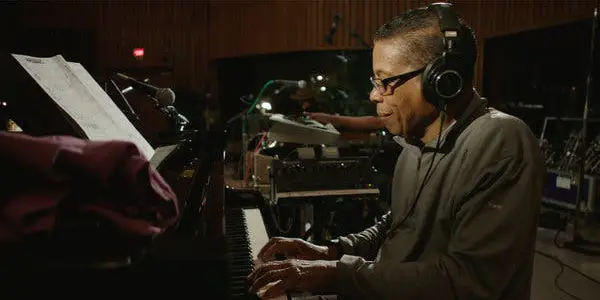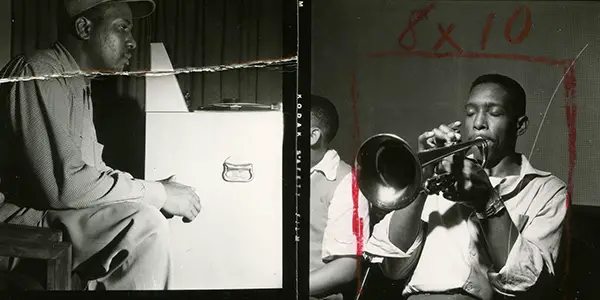BLUE NOTE RECORDS: BEYOND THE NOTES: By A Fan For The Fans

Arlin is an all-around film person in Oakland, CA. He…
How does one jibe the constrictive elements of a mainstream documentary filmmaking with a subject like Jazz, which inherently rejects such constraints? How can one bring something collectively considered “past” to contemporary relevancy? How do you narrativize something as tenuously defined and varied as a record label?
These are all questions Sophie Huber presumably burdened herself with solving in her second film, Blue Note Records: Beyond the Notes. The label is generally considered unparalleled in its impact on music, singular catalogue, and the artistic freedom it afforded its musicians. Or should I say affords, since the film makes abundantly clear that Blue Note is very much alive and well.
Grounded by the Notes
Documentaries about jazz usually take an approach that either reflects the experimentation of the genre, or rejects it in favor of a chronological showcase of talking heads. This is often dictated by the mainstream awareness of a given film’s subject; the more well known, the less experimentation you can expect.

Blue Note is well known among fans of the music, but less so for those who have yet to develop a love for jazz. I didn’t expect the film would be able to reach the heights of say, a Milford Graves: Full Mantis, but hoped it would at least push against the rigid formal elements that have burdened recent films about giants in the field like Coltrane and Miles. That’s why I was so pleased when the film opened against expectations, grounding itself in the modern day. This lends Blue Note Records: Beyond the Notes an immediacy often lacking among jazz docs, as it’s commonly considered that the genre’s best days are in the past.
Huber sets the scene with an intimately documented live session led by modern-day virtuoso Robert Glasper, giving her film a center to wander from and return to at its leisure. Having eschewed initial expectations, she then moves into the more rote realm of history and biography. In the current context, a label started by refugees fleeing Nazism who sought only to record the music they loved, neglected by established record producers, and eschewing profit motivations, was genuinely inspiring.
But a record label is a different beast entirely for a filmmaker to wrap their head around than an individual artist. The trajectories just go in so many different directions unbound from the tidy chronological trappings of biography. This allows the film to make some detours that vary in efficacy, like spending time exploring individual musicians of the label’s heyday, or a mostly ham-fisted conclusion that ties in the label’s legacy with hip-hop (that somehow entirely omits Madlib’s seminal Shades of Blue).

What holds Beyond the Notes together is the music, buoyed by the riches that are label founder Francis Wolf’s photographs. The film benefits immensely for having its subject supply the soundtrack, the music regularly doing the heavy lifting to propel the film forward and break up the oppression of recollective speech. The film’s brightest moment is one that prioritizes the former over the later, as golden era ambassadors Wayne Shorter and Herbie Hanc*ck step in for a session with Glasper’s band and current Blue Note engineer Don Was.
Even though their participation in this film in some capacity was all but guaranteed, seeing them improvise and reflect together, while symbolically passing the torch to their colleagues on the recording is a moment of pure joy and elation. It’s just such a rare pleasure and the film’s best utilization of direct cinema.
Balancing Exclusivity and Accessibility

When you’re a fan making a film for other fans, it can be freeing on both sides of the filmmaker/film viewer divide to not have to recount things both of already know. This leaves time to enjoy swimming in minutiae and breathing in the film’s non-narrative dalliances. That’s exactly what happens in Blue Note Records: Beyond the Notes, which borrows from the free-form improvisation that built the historic catalog of the label in jumping around from biography to album design to sound engineering. The film is eager to encompass the entirety of what makes Blue Note so special while offering the barest amount of context to try and bring in the uninitiated.
But the flip side of fandom freedom is that you’ll never be able to satisfy the most knowledgeable adherents in the court of their own minds. The tidy sections that the film composes for the disparate elements whose sum forms the culturally significant record label could all have done with more unpacking. The film almost makes the case for a mini-series that would allow for deeper exploration of the label’s components to really shine. In particular the way the film mostly dismisses the 70s Liberty Records period bordered on offensive.
Meanwhile, those to whom Blue Note Records: Beyond the Notes serves as an introduction to Blue Note might find themselves feeling like they’re trying to fill in missing pieces. If they like the music, then maybe this will set them a journey to discover for themselves what the film didn’t have the time or inclination to cover. With the music, the photographs, and the living legends all present, all Huber had to do was not fumble, and the film does enough to clear that low bar with ease.
But few, fan or newcomer alike, are likely to walk away from this film feeling like they were presented with something approaching a comprehensive examination of this titanic presence in music history.
Watch Blue Note Records: Beyond the Notes
Does content like this matter to you?
Become a Member and support film journalism. Unlock access to all of Film Inquiry`s great articles. Join a community of like-minded readers who are passionate about cinema - get access to our private members Network, give back to independent filmmakers, and more.
Arlin is an all-around film person in Oakland, CA. He received his BA in Film Studies in 2010, is a documentary distributor and filmmaker, and runs Drunken Film Fest Oakland. He rarely dreams, but the most frequent ones are the ones where it's finals and he hasn't been to class all semester. He hopes one day that the world recognizes the many values of the siesta system.













